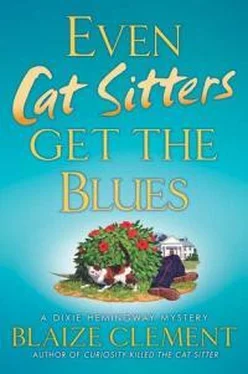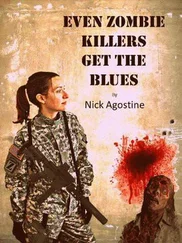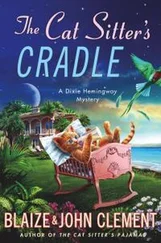I said, “Why was Krishna blue?”
He grinned. “Don’t know, but I doubt it was for the same reason your guy is blue.”
“You think I should give him the message? About Ziggy not being an option?”
“How would you feel if you didn’t, and the iguana died of some condition that Kurtz could have treated him for?”
Ziggy seemed about ten or twelve years old to me, not terribly old for a healthy iguana, but maybe he wasn’t healthy. Maybe the caller knew something about Ziggy’s health that made it imperative that Kurtz take some sort of action before it was too late.
I said, “You think that’s what the message means?”
“Hell, Dixie, I don’t know what it means. I also don’t see why they can’t just call Kurtz and tell him directly. They’ve got some kind of game going, and sending mysterious messages must be part of it.”
I said, “Iguanas and chickens have the same digestive and respiratory systems, did you know that? If Ziggy’s sick, he could take medicine made for sick chickens.”
“Son-of-a-gun, I didn’t know that.”
I sat back with a little sigh of satisfaction. We all have our areas of expertise. Paco knew law enforcement and Hindu scripture, and I knew that iguanas and chickens have the same kind of systems. That may not have made us exactly even, but at least I knew something he didn’t.
FIFTEEN
As we left the diner, I picked up a discarded copy of the morning’s Herald-Tribune from a table by the door. Paco gave me a pat on the butt and got in his car to drive off to whatever secret job he was working at the time. Michael and I don’t ask Paco for details about what he does. He wouldn’t tell us anyway, and if he did the details would make us take up nail-biting as a hobby.
I sat in the Bronco for a minute to scan the Tribune ’s lead story about the latest horror in the world. Everybody claimed the other side was responsible, everybody lied, everybody postured, children died. All our realities are dramatic plots intersecting, each with its own creator and climax and theme. I suppose the conflict is the energy that keeps the universe together, but couldn’t it be conflict of man against hunger, man against disease, man against ignorance, man against despair, instead of man against man?
The guard’s murder and the subsequent fire were all over the front page too, with an article full of “no comment” quotes from Guidry and the fire marshal. There was also a photograph of the grieving widow taken on her front porch. The photographer had caught two street signs over her shoulder. Even though the address wasn’t given, anybody familiar with Siesta Key would recognize where it was.
The guard’s wife was a softly pretty dark-haired woman who had lashed out angrily at the female interviewer in what was described as broken English. Without fully understanding what she’d said, the reporter had rather loftily concluded that the widow blamed American society for her husband’s death.
I doubted that a woman who had just lost the man she loved and the father of her children would take such an abstract view of death. Maybe later, but not when her grief was still raw and red. Fresh grief is always personal, and the fury it generates isn’t directed toward a nameless society but toward specific people. For the first year after Todd and Christy were killed, I funneled all my rage toward the half-blind man who had smashed into them in the parking lot, and only later toward a state that routinely allows people to renew their driver’s licenses for a total of eighteen years without a vision test.
I studied the photograph, feeling a kinship with this woman whose husband had been killed in a senseless act of violence. So far as I knew, I was the only suspect in the murder, and I wanted to talk to her. I wanted to know what her husband had told her about Ziggy. I wanted to know if she had any idea who had called me to go to the Kurtz house.
I found the house easily enough, and as I pulled into the driveway I wondered how many other people had identified its location from the newspaper photograph. As I had expected, it was a weather-beaten Florida cracker house, with a front porch wide enough for a swing and chairs for visiting. A new red tricycle with plastic streamers on the handlebars sat on the cracked sidewalk, and an equally new girl’s pink two-wheeler leaned against the porch railing.
As I went up the steps to the porch, I saw a little girl who looked to be about six years old sitting with her legs spread apart to make a nest of her skirt. A calico kitten was in the nest, and the child was tickling the kitten’s nose with a fluff of yarn. The kitten was probably a Persian mix, and definitely a true calico, not a tabby or tortoiseshell that often get mislabeled as calicoes. From the alert way it was leaping at the yarn, I could tell right away it was healthy and intelligent.
The little girl was so intent on the kitten that she barely gave me a glance. Being a fool for kittens, especially calicoes, I went over to kneel beside the child and make the aaahing sounds that probably originated with someone who was kitten-smitten.
I said, “What’s her name?”
The child gave me a level dark-eyed stare. “How’d you know it was a girl?”
“All calicoes are girls. Well, every now and then there’s a boy, but mostly they’re girls.”
She nodded slowly, and I recognized the look I’d always given people when I was her age and didn’t have a clue what they were talking about.
I said, “Calico means she has three colors, black, orange, and white, and the colors are in big separate patches, not striped or swirled together.”
“You wanta hold her?”
That’s the neat thing about kids. They don’t really care about their pets’ official names, and they don’t think it’s weird that a grown woman would want to hold a bit of fluffy kitten just for the pure pleasure of it.
Gracious as a hostess at a tea party, she tenderly scooped the kitten up in both hands and handed her to me. Surprised and offended at the yarn game ending so abruptly, the kitten stretched its little needle claws into my palms.
When I winced, the child said, “Hurts, don’t it? We’re going to get her fingernails taken out so she can’t do that.”
I said, “Oh, no—”
The front door flew open and a Hispanic man stepped out with a furious frown on his face and his stiffened arm palm up like a traffic cop.
“Get away from here! Leave us alone! This is a house of mourning, and you people are … are … you are without shame!”
That pretty much answered the question of whether anyone else had been led to the house by the photograph.
I disengaged the kitten’s claws from my hand, set it back on the girl’s skirt, and got to my feet.
“I’m not a reporter, sir. I’m Dixie Hemingway.”
The little girl was watching us, so I stepped closer to him and lowered my voice almost to a whisper.
“The same person who killed Ramón Gutierrez tricked me into going to the house to take care of the iguana that lives there.”
He dropped his hand and peered at me suspiciously. “You take care of the iguana?”
“Just since yesterday. I’m a pet sitter. I don’t know who called me to go there, but I know it’s tied in somehow with … what happened.” Assuming the child was the murdered man’s daughter, I tilted my head toward her to signal that I didn’t want to talk about the murder in front of her. “I got to the house shortly after … you know. I was hoping I might speak to Mrs. Gutierrez. Maybe her husband told her something.”
“My sister knows nothing.”
He sounded so bitter that I didn’t think he was referring solely to the murder.
Читать дальше












